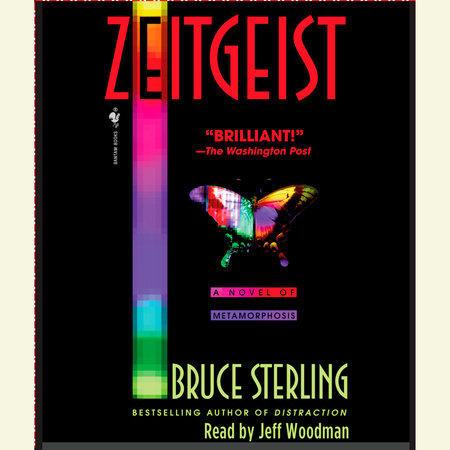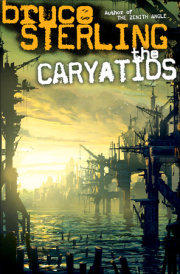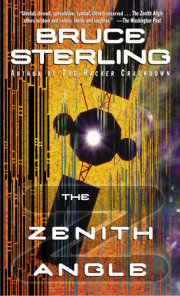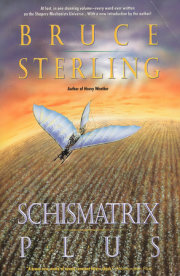Summer in Istanbul. Roses in a hammered silver urn. Fresh-ground coffee in a shiny brass hand-mill. The rich tang of fertilizer and fuel oil hung over the damaged cafe. Starlitz could smell the hot caramel aftertaste of the car bomb, right through the baked metal, smashed cement, and burnt upholstery.
“Where are the girls?” said the Turk.
“The girls are in Cyprus. They’re partying.”
“With Greeks?”
“Oh, heavens no,” Starlitz assured him. “The girls are in the fun part of Cyprus. Turkish Cyprus.”
The Turk smiled. He picked open the lid of the coffeepot and deposited a heaping spoon of brown sugar.
Starlitz leaned back in his wrought-iron chair and folded his plump hands over his lilac waistcoat. He and the Turk sat in companionable silence, with hooded eyes behind their designer shades, and watched the pot reach a boil.
The Turk, who called himself Mehmet Ozbey, was young, and rich, with a film star’s good looks. In his Italian leather jeans and camel-hair jacket, Ozbey was the picture of masculine chic.
Starlitz felt at peace. Local events were going very much his way. There had been a time in his checkered career when he would have shown up in Istanbul two days before a car bomb. He would have hit town with the plan, and the contacts, and the agenda, and he would have found the old city strained and jittery with fatalistic Ottoman tension.
Here at the tag end of the twentieth century, however, Starlitz was pampered by circumstance. He had arrived in Istanbul two days after a car bomb. The catastrophe was behind them now. They had entered the professional realm of consequence management. Bored Turkish cops measured their new monster pothole with yellow metal pull-tapes. Indifferent janitors swept up the scattered tonnage of broken glass. Istanbul downtown girls, in their chunky gold chains and Chanel suits, were trying to window-shop through the street’s battered length of plywood sheeting.
Mere domestic terrorism could not cause Mehmet Ozbey to break a business appointment. The shrapnel-damaged cafe was almost deserted, but the young pop promoter had arrived bang on time, clean, shaved, sober, and toting a white calfskin valise. The cafe Ozbey had chosen was lovely, though its windows had all been shattered by the car bomb’s concussion. The cafe staff doted on Ozbey, touched by his loyalty during their trying circumstances. They kept tiptoeing up to offer lacquered trays of sliced melon and baklava.
A young woman passed the damaged cafe and caught sight of Ozbey. Instantly entranced, she stumbled headlong into a striped police sawhorse.
“My little girlfriend Gonca,” Ozbey remarked solemnly, “would very much like to meet your G-7 girls.”
“I’m sure that can be arranged.”
“She’s especially fond of the French One.”
“Everyone has a favorite G-7 girl,” Starlitz allowed.
“The French One has the most talent,” said Ozbey judiciously. “She can almost sing.”
Starlitz nodded. “Yeah, that’s her Left Bank cafe chanteuse riff.”
Starlitz and Ozbey watched the pot foam up, once, twice, and the full and traditional third time. Starlitz was pleased to have stolen this moment from the onrushing millennium. It was important to pry these little breathing spaces from the final hum of the dying century. It was good for him, like oxygen.
Ozbey removed the curved pot from its flickering burner, and with exaggerated hostly care he began to pour.
“Why is there no Russian G-7 girl?” Ozbey said, setting the pot aside. “Because it’s the Group of Eight now, officially. With Russia.”
“That’s an odd thing,” said Starlitz, accepting his cup. “No one ever asks me why we have no Russian girl in the group. Unless they’re Russian.”
“You don’t like Russians, Mr. Starlitz?”
“I fucking love Russians,” Starlitz said politely, “but Russians just don’t get it with the tie-in merchandising angle. They still think that a pop group has to sell music.”
Ozbey removed his shades, folded them fastidiously, put them in an inner jacket pocket. He lifted his gleaming demitasse and gazed at Starlitz across its gilded rim. “‘Selling the whole concept,’” he quoted.
“Right you are.” Starlitz savored a sip. He rinsed his molars with the coffee grounds. That subtle flavor of cardamom. Business was good.
Ozbey cocked his freshly coiffed head. “We sell the big picture. We sell the whole bag of wax.”
“It’s the spirit of the times.” Starlitz nodded. “It’s the soul of postmodernity.”
“We sell little plastic dolls, for instance.”
“‘G-7 action figures,’” Starlitz corrected.
“They’re very popular with children. And the lip gloss. The candies. Those very big shoes that they wear.”
“Yeah, G-7 WonderBras, G-7 pantyhose — the tie-in apparel thing has definitely been a breakthrough area for us.”
Ozbey put his cup down and leaned in intently. “Who is your supplier? For the clothes.”
“Indonesia, mostly,” said Starlitz. “Before the currency crash.”
Ozbey placed his jacketed elbows on the polished marble tabletop. “My Uncle the Minister,” he announced, “has many interests in the Turkish apparel trade. He is very influential in domestic Turkish manufacturing.”
“You don’t say.” Starlitz scratched his double chin thoughtfully. “That’s very interesting.”
“My Uncle the Minister has extensive interests in the Turkish Republic of Northern Cyprus.”
“The Republic is a very interesting place,” said Starlitz, leaning forward in tandem. “After just one week on the ground in Turkish Cyprus, I could tell that it’s a country of tremendous opportunity.”
Starlitz lifted one meaty hand in mock demurral. “Yes, I know — some people claim that the Greek half of the island has a better tourist industry. But if you ask me, the Greek scene in Cyprus is yesterday. They’re all overbuilt and tapped out. All those nightclubs, and the rave scene, and the big cruise ships in from Beirut...”
“Let me show you the Meridien,” said Ozbey. “Turgut Altimbasak’s casino in Girne. That establishment is very ... what is the English word?”
“‘Suave’?”
“Yes! Very suave, very international-playboy. Mr. Altimbasak is a friend of my uncle’s. You could gamble freely there, Mr. Starlitz. You could run a big tab.”
Starlitz considered this bold proposal. It was very much to his liking. “Call me Lech,” he said.
“Okay!” grinned Ozbey. “You call me ‘Mehmetcik.’ Mehmetcik, it’s like ‘Johnny.’”
“Mehmetcik, my friend, let’s be frank together,” said Starlitz, steepling his big blunt fingers. “In the past we in G-7 were very displeased with our offshore accounts in Jersey and Bimini. But then you brought those Turkish Cypriot banks to our attention. Your Uncle the Minister had a few helpful words there. It’s all very smooth now. That broke up the red tape. My accountant’s very happy about all this.”
“It’s good to have happy accountants,” said Ozbey. “We should all have happy accountants.”
“We can all be very happy doing business together,” Starlitz said. “As long as we always remember the number-one G-7 rule.”
“The number-one rule is that everything shuts down before the year 2000.”
Starlitz leaned back in contentment. “Mehmetcik, I knew you were special from the first time you sent us fan mail.”
Ozbey nodded intently. He was shifting gears now, onto his favorite topic, himself. “People tell me that I’m special,” he concurred. “My Uncle the Minister, my wife, my girlfriend, my many good friends in the pop business world — they all say I have a very special gift.”
Starlitz watched as a starstruck Turkish housewife entangled herself in a flat yellow strand of police tape. “Yeah,” he offered.
“I have a gift. Don’t you agree?”
“Absolutely, Mehmetcik. It’s written all over you. It couldn’t be more obvious.”
Ozbey sat up. “And you, Lech. You are also a gifted man. Obviously.”
Starlitz shook his head.
Ozbey’s dark eyes gleamed. “Don’t be shy! People tell me things, behind the scenes. They tell me: This man Leggy Starlitz, he is more than just a businessman. He is an imam. Like they say in Silicon Valley, he’s a business guru.”
“Aw, forget that industry scuttlebutt. Musicians are way superstitious. They’re full of New Age crap.”
“Do you know the future? They say that you do.”
Starlitz shrugged. “Sure I do, sorta. I’m into consumer trends, man. It’s all about pop, right? Demographic analysis. Demand curves. Stoking the hit machine. It’s an Internet thing, basically.”
“Then you do know the future.”
“Aw, crystal balls are for suckers.” Starlitz scowled. “You want some supernatural powers, pal? Find a money laundry. You can work miracles with those things.”
Ozbey frowned. He daintily lifted a wedge of sliced melon, changed his mind about tasting it, and tactfully put it back down. “To speak life’s deepest truths across two languages ... It’s very hard to speak about these secret things. There are so many important secrets in life — realities that are never said.”
Starlitz very loudly said nothing. To fill the silence he watched a Turkish crow pick its way across the cafe’s rooftop. The dusty bird, its trash looter’s eyes like two bullet tips, was shivering with greed. Starlitz surreptitiously dropped a chunk of melon.
Ozbey toyed with the ornate coffeepot. “Please tell me that you somehow understand these secret truths I cannot speak.”
“Mehmet, just put a lid on it, okay? Don’t even go there.”
“But we are business partners. I must be sure you understand. I must be very clear from the beginning.” Ozbey sighed and lowered his voice. “I am a powerful secret master of the modern world’s deeper reality.”
“I’m hip!” Starlitz insisted, wincing. “I’m so hip that you didn’t even have to tell me that you weren’t saying that.”
“You and I can both break the laws of nature at will. We are great adepts with supernatural abilities that fools would find fantastic.” He examined Starlitz with frank concern. “Am I saying too much?”
“Mehmetcik, that dervish crap moves a lot of product in your part of the world, but I’m in a global outfit, so I’m not in the market for it. You’re a heavy operator with a lot of local connections. I know that, I respect that. That and a handshake, that oughta be enough for both of us. Let’s leave the deeper reality under the rug where it belongs.”
Ozbey seemed disappointed, but he was bearing up. “I see you came to my town of Istanbul to talk about the rug business. Yes? It’s nothing but business with Leggy Starlitz. Very well. I am your host, I will be polite. Say no more.”
Starlitz said nothing. The air was heavy with coffee and roses.
Ozbey reached deftly across the table and plucked up Starlitz’s coffee cup. “Since I am your host, let me entertain you. We have an old tradition here in Istanbul. We can read a man’s future in his coffee cup.”
“Hey, I was drinking that,” Starlitz protested.
“I’m very good at this,” Ozbey insisted. He brandished the demitasse with an aggressive grin, ritually swirling the coffee grounds. “What is your future, Leggy Starlitz? Let us see.”
“You don’t want to try that with me,” Starlitz told him.
“Don’t tell me what I want,” said Ozbey calmly. “Save that for teenage girls. I know very well what I want. I know it much better than you.” Ozbey cradled the coffee cup in both his hands. Then he gazed inside it, with a careful squint.
The cup was empty. It was perfectly clean.
The black rubber plates of the luggage conveyor track moved with eerie mechanical ease. Jet-lagged passengers appeared in silent clumps, awaiting their gear like the bored parishioners of some failing religion.
An apparition sidled silently past Starlitz. Floppy gray fabric hat, long translucent raincoat over bony shoulders, two camera cases and a folded tripod bag, a lumpy photographer’s vest and multipocketed khaki trousers. The ensemble ghosted through the airport on a pair of high-ankled Adidas monkey boots.
Starlitz tossed aside his glossy copy of
Mixmag and rose from his red plastic seat. “Hey, Wiesel.”
Wiesel rotated his narrow head, his pale eyes like gimlets. The paparazzo’s blank face swam into focus then, and it registered resigned distaste. “Leggy, what are you doing in Istanbul?”
“Is this Istanbul, man? All airports feel the same to me.”
Wiesel shrugged uneasily. “Where are the girls?”
“The girls got a few days off. They’re poolside in a secret hotel. Naked and covered with cocoa butter.”
Wiesel’s sallow face showed a flicker of reflexive interest, but it faded rapidly. “G-7 are yesterday.”
“They’re yesterday in London, man, I agree with you there. In the London scene, fuckin’ tomorrow is yesterday. But spangled hose and lip gloss are the coming thing in Teheran.”
Wiesel examined the passing luggage, feigning indifference. Starlitz, who knew better, watched him weakening.
Wiesel’s eyes flicked up. “You mean to scam the mullahs, Leggy?”
“New regime in Iran, pal. Big window of opportunity there. I need your help again.”
Wiesel detached one swollen camera bag from the shoulder of his flimsy raincoat and set it with care on the floor. “Give it a rest! You and your boss man have nothing left to work with. The gimmick’s two years old. Fuck, they’re not even a band. They can’t sing. They can’t dance. They lip-synch. To tapes.”
Starlitz shrugged.
“They don’t even have names,” Wiesel insisted. “They’re seven random birds you picked up with adverts.”
Starlitz nodded. “All according to plan.”
“You’re gigging the arena circuit for chump change, in deepest, darkest Eastern Europe. There’s just nothing there, lad. You can’t make big stars out of nothing at all.”
Starlitz sighed patiently. “Who needs big stars? Big stardom is poison. This is all about the marketing concept. The first pop group that won’t sell music. The first pop group with an expiration date.”
“Like I said, gimmicks.”
“Lemme tell you about this upcoming Istanbul gig. It’s the first leg of our big Islamic pop tour. The setup behind this one is a thing of genius.”
Wiesel was visibly twitching. Celebrity bored him, but the lure of a well-planned hustle was more than Wiesel could withstand.
Then something caught Wiesel’s gimlet eye, and an expression of relief flooded his face, giving it an almost human cast. He rotated smartly on his rubber heel.
A motorized wheelchair had arrived at the baggage claim. It bore a woman in an off-the-shoulder Lycra stretch dress. She wore a blond wig: a bubble-headed cut with a broad wing of bangs. She had big blue eyes, and enormous breasts, which rose from her torso with the taut inflated look of sports equipment.
The wheelchair eased to a buzzing halt. Its female occupant looked Starlitz up and down, taking in his lime-green linen suit, the diamond pinky ring, the Gucci shoes.
Slowly, she emitted a stream of smoke. “Friend of yours, Benny?”
“It’s business, Princess.” Anxious to please, Wiesel stiffened. “This is Leggy.”
“Lech Starlitz.” Starlitz cordially offered his hand. The woman switched hands with the cigarette, absently wiped ash into the glittering Lycra fabric on her meaty thigh, and gave Starlitz’s fingers a damp, condescending squeeze.
“You can call me ‘Diana,’” she told him. “Most people do.”
“Is it dystrophy?” Starlitz asked her.
She smiled. “Nah.”
“Multiple sclerosis?”
“Nope!”
“It couldn’t be BSE.”
“Aw, fuck no! I don’t eat hamburgers, I’m a fuckin’ dancer!”
“It’s autoimmune syndrome,” Wiesel offered. “She’s allergic to herself.” He jerked one thumb at the luggage track. “I got her CAT scans with us. I got her full NMR scans. You should see all my prints, Leggy. They’re beauties.”
The woman pointed one lacquered finger. “My bags, Benny. Go get the damn bags.”
Copyright © 2000 by Bruce Sterling. All rights reserved. No part of this excerpt may be reproduced or reprinted without permission in writing from the publisher.








